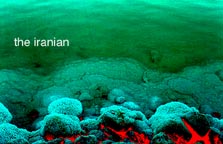

|
|
Alive by the Dead Sea By Roya Hakakian - Sure we have American style latte. We have anything you want. But if you dance, it is going to cost you ten Shekels. Twenty Shekels, if you don't. Galit murmured. She leaned very close toward me, as if her proposition was an invitation for something much graver than a perfectly dismissible cup of coffee. For a moment, I felt not a like a person but a portrait of one -- framed on four sides by the all too palpable anticipation of those gazing at me. To one side stood the lanky Arab-Israeli man behind his fruit counter, resting an arm on his juicer. On another was the Russian- Israeli soldier sitting with an AK-47 on his lap. A thin Palestinian teenager in his swimming trunk stood on yet another side. And at last, there was Galit, the blond Jewish- Israeli host and owner of the café by the Dead Sea. Like all the human beach beings, her easy, tattooed and deeply tanned semi- nudity was stunning, despite its imperfections. I had every reason to say no. In addition to being a lousy dancer, my daily dose of Starbucks back in New York cost twice as much. But forces, other than my usual amiability, were at work. These days in Israel, a land in whose economy tourism played a critical part, the locals look to tourists for much more than their desperately needed cash. The currency of good cheer and high spirits is in equal demand. The two nemeses, Arabs and Jews, seek it for different reasons. But both want it as vehemently as the other. For Jews, any escape is a relief, for they are deeply hurting. They are after all Sabres, as born Israelis refer to themselves. Jewish-Israelis are probably the only people in the world who do not describe their nationality by the virtue of their locale -- but by their acute perception of how they are regarded by others. Sabres refers to a desert fruit -- thorny on the outside and succulent and sweet on the inside. Jewish- Israelis will rarely admit their grief to strangers. They will, however, tease others into helping them forget. They are, by nature, too animated to be stoic but their pain is a historic lot that they feel they must bear alone. The Arab-Israeli juice man hearing that I was a tourist, gave me a hearty welcome. The frustration of the Arab-Israelis is as undeniable as the summer heat of the land. So is their sense of heavyheartedness over what they fear may be the loss of an ancient and cherished reputation as a gentle and hospitable people. In a short car ride or a chance encounter in an elevator, they do their best to express warmth. They overextend themselves to be helpful. Their exaggerated efforts have an apologetic touch for that unmentionable reason that has kept all the tourists away from the country.
It is at the threshold of this encounter of water with an Earth dry as kindling that the tame fire of Galit's cafe burns. Deep in the valley where the sea lies, there is no view of the Wailing Wall, the Al-Aqsa Mosque or the checkpoints. No sound of sirens. Or the newly acquired slew of Jewish phobias like claustrophobia or agoraphobia. In few places in the Promised Land is the promise delivered these days. Galit's little café is among the few. Upon Galit's invitation, no one, no matter how foolish they might look while dancing, could resist getting up instantly to move to the blasting sound of her Latin medley. It would feel wrong. In her little café, harmony takes on a meaning beyond music -- it is the greatest of aspiration of the café's few regulars. Anyone, however removed from their plight, is overpowered by it. They all yearn for the lost pleasure of a busy time when the customer was always right. Fortunately for me, I was the only customer to wash on their shores in weeks. - Would you like a glass of fresh squeezed orange juice? The juice man asked me, in a gesture of appreciation. I said no but thanked him. A few minutes later, he appeared with a tall glass of juice. I realized at that moment how I had failed to recognize that the only force keeping a place like that standing amid all odds was the wisdom of surrender. These few people knew the excruciating effort, but ultimately the liberating power of yes, of giving in. It is what made the place run. As I drank the juice, he said, "I will give 600 camels for your hand in marriage." As I looked at his shriveled oranges in the rented cooler, it was obvious that he possessed no such fortune. But he was fulfilling the obligations of another time when appeasing and entertaining the guests, even at the cost of perpetuating their worst stereotypes, was the duty of any good host. A time when he ran a café of his own a few miles away in Jericho. But now, Galit's place was the only one still open. On the shelves of her little store, rows of hookahs sat idly, dreaming of smoke. Bathing suits hung on the round racks with their multiple discount tags waving in the wind. Any other business would have long shut down. But this café stood as a testament to a love greater than the one for the land: the love for the sea.
Before leaving, I asked the juice man for the price of the glass of juice he had served me. Only a kiss, he said. I left ten Shekels on his counter, and a kiss on his cheek.

|
|
Web design by BTC Consultants
Internet server Global Publishing Group
































